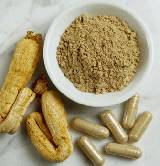- 8 Ways to Increase Dopamine Naturally
- 7 Best Breads for Maintaining Stable Blood Sugar
- Gelatin vs. Collagen: Which is Best for Skin, Nails, and Joints?
- The Long-Term Effects of Daily Turmeric Supplements on Liver Health
- Could Your Grocery Store Meat Be Causing Recurring UTIs?
- Are You Making This Expensive Thermostat Error This Winter?
- Recognizing the Signs of Hypothyroidism
- 10 Strategies to Overcome Insomnia
- Could Artificial Sweeteners Be Aging the Brain Faster?
- Techniques for Soothing Your Nervous System
Study Links Americans’ Low Fiber Intake to Higher Heart Risk


FRIDAY, Oct. 25People who don’t eat enough fiber seem at increased risk for heart problems, and too few Americans are consuming enough fiber, a new study says.
Researchers analyzed data collected from more than 23,000 U.S. adults between 1999 and 2010 and found that low fiber intake was strongly associated with heart disease risk factors such as obesity, inflammation and metabolic syndrome. The syndrome is a group of symptoms that puts people at increased risk for diabetes and heart disease.
Previous studies have found that dietary fiber may help lower blood pressure, cholesterol levels and inflammation. Despite those findings, this new study found that Americans don’t have enough fiber in their diets.
Fiber-rich foods include fruits, vegetables, legumes and grains.
The Institute of Medicine — an independent nonprofit organization that advises the U.S. government on health issues — recommends 38 grams of fiber a day for men aged 19 to 50 and 30 grams a day for men over 50. The IOM recommends 25 grams a day for women aged 19 to 50 and 21 grams a day for women over 50.
But the average dietary fiber intake among the study participants was only about 16 grams per day, according to the study, which was published in the December issue of the American Journal of Medicine.
The new findings show the need to develop new strategies and polices to increase Americans’ dietary fiber intake, study senior investigator Dr. Cheryl Clark, of the Center for Community Health and Health Equity at Brigham and Women’s Hospital and Harvard Medical School, said in a journal news release.
The researchers also found racial and ethnic differences. Compared to whites, Mexican-Americans had higher levels of fiber in their diet, while blacks had lower levels.
More information
The American Academy of Family Physicians explains how to increase the amount of fiber in your diet.
Source: HealthDay
Copyright © 2026 HealthDay. All rights reserved.










